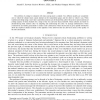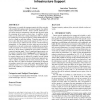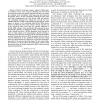163 search results - page 19 / 33 » Concatenated codes can achieve list-decoding capacity |
CORR
2007
Springer
13 years 6 months ago
2007
Springer
The problem of coding for channels with time-varying state is studied. Two different models are considered: one in which the channel state cannot depend on the transmitted signal,...
MOBICOM
2003
ACM
13 years 12 months ago
2003
ACM
In this paper, we consider the transport capacity of ad hoc networks with a random flat topology under the present support of an infinite capacity infrastructure network. Such a...
ICASSP
2011
IEEE
12 years 10 months ago
2011
IEEE
The recently-discovered polar codes are widely seen as a major breakthrough in coding theory. These codes achieve the capacity of many important channels under successive cancella...
MOBIHOC
2007
ACM
14 years 6 months ago
2007
ACM
Existing work on the capacity of wireless networks predominantly considers homogeneous random networks with random work load. The most relevant bounds on the network capacity, e.g...
VTC
2010
IEEE
13 years 5 months ago
2010
IEEE
—1 Hybrid Automatic Repeat reQuest (ARQ) plays an essential role in error control. Combining the incorrectly received packet replicas in hybrid ARQ has been shown to reduce the r...



